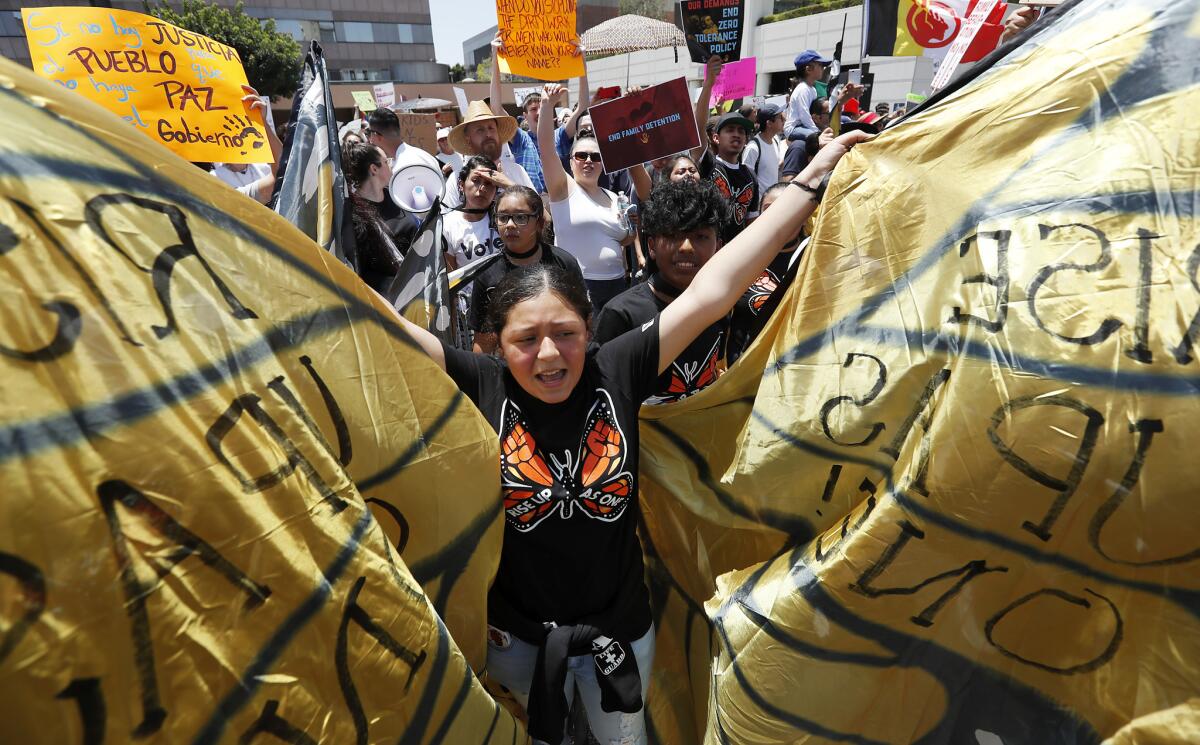Shady immigration services are preying on L.A. County migrant workers

- Share via
The Trump administration’s new immigration policies — along with a host of recent draconian enforcement actions — are producing an all-too-predictable and unfortunate consequence: a dramatic increase in the number of victims of immigration services fraud.
Complaints about unscrupulous immigration services providers in Los Angeles County jumped almost 90% in 2018, to about 275 cases, according to the county’s Department of Consumer and Business Affairs.
The sharp increase in complaints is alarming, and likely represents only a fraction of the problem. Under California law, an individual can register to become an immigration services provider without any education or experience. Registered or not, these individuals — even if well-intentioned — regularly violate the law by providing legal advice, which state law specifically prohibits.
There are about 1,100 registered immigration services providers in California, according to the secretary of state’s office. No one can know with certainty how many providers are operating illegally, but they are often found working the streets in high-traffic pedestrian areas such as Grand Central Market in downtown Los Angeles and in and around local courthouses.
The trend toward predatory immigration services providers is likely more prevalent in California than in any other state. California is home to about 3 million immigrants who have entered the country illegally or overstayed their visas, according to the Migration Policy Institute, and account for about 8% of the state’s population.
Many immigrants are understandably afraid to come forward and acknowledge that they’ve been scammed — often by the services providers they hired — because they fear retribution or being deported. Other immigrants become aware they’ve been ripped off only when federal authorities contact them to say something is amiss with their application.
Shady services operators market themselves as a more affordable and reliable option than an immigration attorney, and then routinely take advantage of customers who often have limited English language skills and little to no understanding of complicated immigration laws and regulations.
Complaints against the operators range from paperwork not being filled out correctly and required documents not being included in an application to more nefarious errors such as dispensing incorrect legal advice or charging for doing no work at all. For low-income and hardworking immigrants, the consequences can be steep — the worst cases lead to deportation. Others lose hard earned wages or life savings.
Complaints like these have been rising for years. Last year’s huge increase followed a more than 40% increase in complaints in 2017.
Latino immigrant communities, where such services providers are known as notarios or notarios publicos, have been particularly targeted. In Latin America, notarios publicos are highly trained and specialized lawyers, a fact many phony operators exploit to attract customers who don’t know the difference between those services and the counterfeit ones in California.
But the problem is not confined to the Latino community. In the most egregious case thus far, Los Angeles County Dist. Atty. Jackie Lacey charged two San Gabriel Valley residents with fraud in May after they allegedly extracted $1.5 million from seven Chinese nationals who were told they could obtain visas in exchange for investments in restaurants owned by a perpetrator of the scam.
Between 2015 and 2019, Lacey’s Notario Fraud Unit brought charges in more than 300 cases that bilked Los Angeles County immigrants out of $4.5 million.
Under the Trump administration, immigration proceedings and paperwork have grown so complex that they often leave no margin for error, fueling the rise in complaints and monetary losses due to fraudulent immigration services providers.
A federal policy implemented last year allows officials in Citizenship and Immigration Services to deny any visa or green card application that is missing documentation or contains an error. Previously, officials were required to request additional documentation to correct gaps in the paperwork. Failing that, 30-day warnings were then issued to inform applicants they would likely be rejected. Applicants can now be denied outright and immediately referred to deportation proceedings.
The paperwork required to immigrate legally can be overwhelming. One common form — that requires legal advice and allows immigrants to adjust their immigration status — is 20 pages long, with almost as many pages of instructions.
The one immigration form that doesn’t require legal advice is a change-of-address form, Julia Vazquez, a Southwestern Law School immigration professor, testified in a state Assembly hearing early this year.
In an effort to protect immigrants and stop this fraud, a broad coalition of government, legal aid and community-based organizations is sponsoring Assembly Bill 1753, which would allow only federally accredited nonprofit organizations and licensed attorneys to provide fee-based immigration services. The bill made it through the Assembly and is awaiting a vote in the state Senate.
This legislation needs to become law. It is critical that immigrants receive competent legal advice from experts in immigration law.
The bill would align California law with the federal law regarding immigration services providers and uphold a recent California appellate court decision prohibiting non-attorneys and people who are not authorized by the federal government from preparing immigration-related documents.
Immigrants have played a vital and defining role in California’s nearly 169-year history, helping create what is now the world’s fifth-largest economy and making significant contributions to our rich civic and cultural life. We should empower and protect those who seek legal citizenship. AB 1753 is a step in that direction — a sensible, reasonable and overdue solution to protect immigrants from fraudulent immigration services providers.
Hilda L. Solis represents the 1st District on the Los Angeles County Board of Supervisors. Stewart Kwoh is the founding president and executive director of Asian Americans Advancing Justice, a Los Angeles civil rights group.
More to Read
A cure for the common opinion
Get thought-provoking perspectives with our weekly newsletter.
You may occasionally receive promotional content from the Los Angeles Times.









